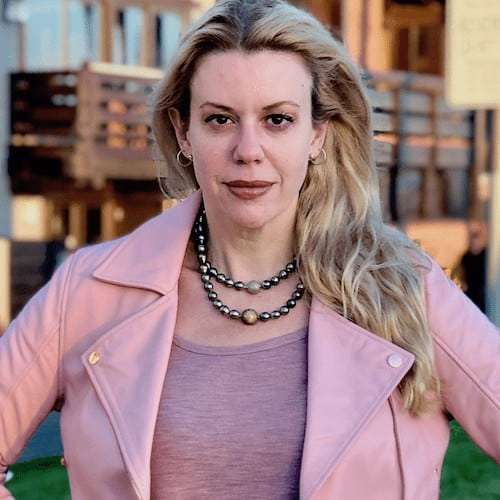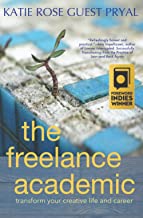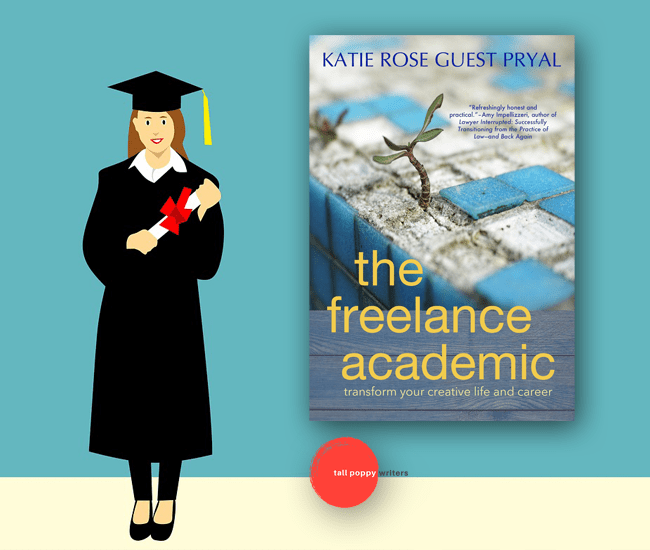The Freelance Academic by Katie Rose Guest Pryal
Many people eschew the label “freelancer,” believing it projects the image of a low-level worker typing away in their parents’ basement. But if you’re an untenured academic, chances are you’re already a freelancer—even if you don’t identify as one. And the sooner you embrace your status as a one-person business, the sooner you’ll be able to start crafting a livelihood that allows you to thrive using the knowledge, talent, and skills you spent years honing. That’s what Katie Rose Guest Pryal, Ph.D., J.D., realized after more than a decade of working as a lecturer and contingent faculty member in higher education. Pryal—who’s a novelist, journalist, essayist, attorney, and former law professor—recounts her breakup with academia and reimagining of her career in her new book, The Freelance Academic (Blue Crow). The result is both a piercing examination of how higher education institutions exploit adjunct faculty and untenured staff and a roadmap that’s as practical as it is hopeful for anyone with an advanced degree wondering if there’s a better way. (Spoiler alert: There is.)
Pryal is hardly the first to note that in the U.S., higher education runs on underpaid and overworked staff who have little to no chance of joining the prestigious but ever-narrowing ranks of tenured professors. (Four decades ago, close to 80 percent of college faculty members were either tenure or tenure track. Today? Two-thirds of faculty are non-tenure—and most have to work several different teaching jobs to make ends meet.) Says Pryal toward the beginning of The Freelance Academic, “As scholars and teachers, we work in overstressed conditions with inadequate resources, many of us hoping that somehow—some way—the academic world will right itself again. But the academic world isn’t going to right itself again. It’s changing, and it’s not going to change back.”
Why would anyone put up with this sort of exploitation? As Pryal explains, institutions often dangle the promise of a permanent gig—and it can take a long time to realize that promise is always just beyond reach. She says, “Stop hoping that the department where you are contingent is suddenly going to recognize that you are awesome (despite the fact that you are, indeed, awesome). They’re not … No matter how awesome you are, it just won’t happen.” She’s quick to add that there’s more at play than wishful thinking. If you’ve spent most or all of your adult life as an academic and have always envisioned your career within the walls of academia, untethering yourself from that identity can be difficult, and even crisis-inducing.
Yet when you finally untether yourself, you may discover—as Pryal did, leaving academia to work as a writer, author, consultant, and co-founder of a publishing company—that what awaits you is far better than what you left behind. Becoming a freelance academic allows you to live where you’d like, she notes, rather than ending up wherever the job market takes you. Instead of feeling trapped in a too-narrow track, you can opt for projects that excite you. Above all, you’re able to say goodbye to far too little pay and an elusive reward that may never arrive. (“They’re never going to let you into the club,” Pryal wryly observes.)
Freelancing can seem daunting at first—especially if you’re still paying off student loans or have other major financial obligations—but The Freelance Academic lays out concrete steps for finding rewarding and lucrative work. Among other topics, Pryal talks about how to shed imposter syndrome and launch your career “like James Bond” by being a pro from the get-go. Even most crucially, she details how to run your business as a business (for example, incorporating—a seemingly intimidating process that’s actually quite simple and can save you thousands of dollars in taxes while offering an added layer of legal protection from issues like libel claims). If you’ve ever reassured yourself, as Pryal once did, that “second-class academia is better than most jobs,” know that there’s another option—and while it may look little like the dreams that brought you to academia in the first place, it certainly makes reality a lot more appealing.
The Freelance Academic is now available.
About Katie Rose Guest Pryal

Katie is a bestselling novelist, essayist, and attorney in Chapel Hill, North Carolina. She is the author of fiction, including Entanglement (2015), Chasing Chaos (2016), and Fallout Girl (2018), all from Blue Crow Books. She is also the author of the #1 Amazon bestseller Life of the Mind Interrupted: Essays on Mental Health and Disability in Higher Education (Snowraven 2017) and The Freelance Academic: Transform Your Creative Life and Career (Snowraven 2019).
Katie writes regularly for Catapult and Women in Higher Education, and she is the founder and co-editor-in-chief of Disability Acts magazine (disabilityacts.com). She earned her master’s degree in creative writing from the Writing Seminars at Johns Hopkins, where she attended on a fellowship, and her law degree from UNC School of Law. After law school, she clerked for a federal judge, practiced law, and earned her doctorate from UNC-Greensboro before joining the faculty at UNC, where she taught for seven years. She now writes full time and raises two incredible children alongside a house full of shelter pets.
Katie is a member of the Tall Poppy Writers (tallpoppies.org), a community of women writers committed to connecting authors with each other and with readers. Stay in touch with Katie via her email letter, Writing Isn’t Sexy: pryalnews.com.
Buy this Book!
Amazon




